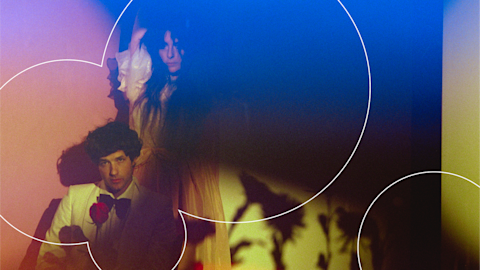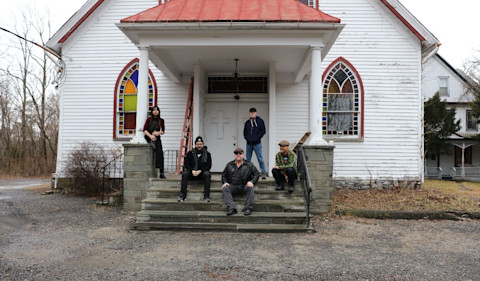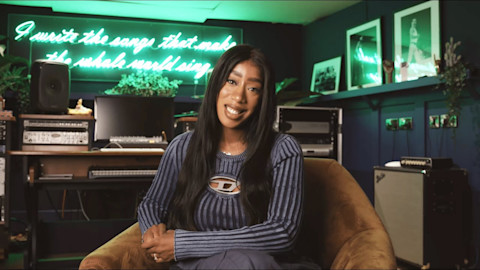In the past three years, Toronto death metal group Tomb Mold have grown from an independent duo to a powerful quartet signed to 20 Buck Spin, releasing albums at a brisk pace and playing shows all over the world. Their breakthrough came with their assertive, riff-laden second LP, 2018’s Manor of Infinite Forms; this year’s Planetary Clairvoyance has a calculated, cataclysmic energy in its pummeling guitar work and caustic percussion.
Tomb Mold’s well-earned critical support has led to even more touring and recording, which has, naturally, required a greater commitment from the bandmembers, putting extra pressure on the ones who still hold day jobs. We caught up with Steve Musgrave, who, in addition to playing bass for one of Canada’s most aggressive metal groups, has worked full-time for almost a decade at promotional products agency Rightsleeve, where he’s the vice president of sales and operations, and isn't planning on stopping.
Spotify for Artists: How did you get started working at Rightsleeve?
Steve Musgrave: We’re like a merch company, but a corporate merch company. We do branded T-shirts, hats, all that kind of stuff. I got into doing this because I wanted to make shirts for a band I was in like fifteen years ago, so I taught myself how to make shirts [laughs]. But I made the worst shirts on earth on my kitchen table. It took a long time. I started hanging out at a studio and learned how to screenprint there. Then, I was living in Toronto and got a job in an industrial screenprinting shop. I had a lot of friends that played in bands, so I started printing shirts for my friends’ bands and their friends’ bands. I was running my own little music merch company on the side. I was tired all the time and my knees hurt, and I smelled like paint thinner, so I wanted to stop actually printing. I saw this company that did kind of the same thing I was already doing, but they were a distributor.
So you were doing this before you started with Tomb Mold.
Oh, yeah. I’ve been with this company for nine years, and I was at the screenprinting shop before that for four years. Payson [Power], who plays guitar in the band, works full-time in a screenprinting shop now, and has for a very long time. We used to work together in the screenprinting shop. I joined the band about three years ago. It was a two-piece recording project for the first six months, and then me and Payson joined.
Have you had any conflicts between work and the band? Anything that’s prevented you from recording or touring?
Definitely. It’s weird to call them conflicts. There’s definitely stuff I’ve said "no" to in the band because of my work. I’m in a really cool company that values what their employees do outside of work. They’re a very performance-driven company, so there’s a lot of leeway to be able to explore personal stuff if you’re productive and you’re accomplishing what you’re supposed to. I’ve done more with the band than I probably would be able to do with a lot of other jobs. There’s been a lot thrown at us over the past year—more than we could possibly do. I’m hesitant to call it a conflict. There have been a lot of choices made.
When you tour, do you work remotely? Or do you use vacation days?
It’s a bit of a mix. [On our summer tour] with Superstition, [I was on vacation]. If something really serious came up for work and they needed me, I’d totally be able to do something for it. But if we’re playing something in town and we have to drive all day Friday, I’m working-ish on Friday. I’m checking my email and responding to things, talking to people on my team.
How often do you guys tour?
[We did] a couple weeks with Superstition [this summer]. We’re doing a couple weeks in Europe in the fall. Other than that, we’ve been squeezing in a lot of weekends where we’ll go and play a few shows. It’s been at least one weekend every month—some months, two or three weekends. It’s funny, because I thought, “We’ll just do two not-super-long tours, and then on the weekends there’ll be nothing.” But the weekends have made it feel like we’ve been traveling constantly.
Tomb Mold record a lot. You had Manor of Infinite Forms and an EP out last year, and then you had another new LP out this year. How do you approach the recording process?
I’m very happy with our record turnout. I think they sound good, and there’s nothing I would change about them. But we do work really fast. I know friends that have bands, and I’ve seen them recording. They’re in studio for a week or a couple weeks, or even a couple months. For our new record, we went in on Friday night and recorded Friday night, all day Saturday, and all day Sunday. We were done in two days.
Do you rehearse the tracks a lot before you go in to record them, so you can knock them out over a weekend?
Yeah. The foundation of the songs are written by [guitarist] Derrick [Vella]. He writes all the guitar parts and brings them into practice, and he and [drummer] Max [Klebanoff] finish them together. It usually comes together pretty quick at practice. For our very first show that we played as a full band, we had two practices. We get things done very quick when we’re working.
Do you foresee any point in the future, if the band stays on this trajectory, that you would ever leave your job?
I’ll definitely balance the two as long as I can do it. I’m happy to say, maybe obnoxiously so, that I’m not in a spot where just I’m waiting for the band to take off so I can quit my stupid job that I hate and live my dream life. I like my job a lot. Getting me to leave it would be very hard. It means a lot to me, and I’ve spent a lot of time building what I’m doing there. My high school yearbook thing that somebody else wrote about me mentioned me making my own punk shirts when I was like 14. It’s what I’ve been doing my whole life, so it’s super-important to me. I want to do both things with my life. I think we do good merch at Tomb Mold, too, so I get to indulge that part of my life. I’ll be out there as long as I can.
—Adam Rothbarth






